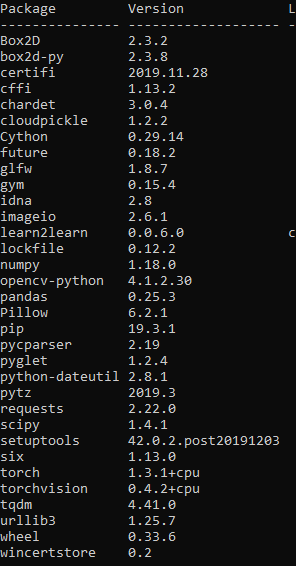learn2learn is a software library for meta-learning research.
learn2learn builds on top of PyTorch to accelerate two aspects of the meta-learning research cycle:
- fast prototyping, essential in letting researchers quickly try new ideas, and
- correct reproducibility, ensuring that these ideas are evaluated fairly.
learn2learn provides low-level utilities and unified interface to create new algorithms and domains, together with high-quality implementations of existing algorithms and standardized benchmarks. It retains compatibility with torchvision, torchaudio, torchtext, cherry, and any other PyTorch-based library you might be using.
To learn more, see our whitepaper: arXiv:2008.12284
Overview
learn2learn.data:Tasksetand transforms to create few-shot tasks from any PyTorch dataset.learn2learn.vision: Models, datasets, and benchmarks for computer vision and few-shot learning.learn2learn.gym: Environment and utilities for meta-reinforcement learning.learn2learn.algorithms: High-level wrappers for existing meta-learning algorithms.learn2learn.optim: Utilities and algorithms for differentiable optimization and meta-descent.
Resources
- Website: http://learn2learn.net/
- Documentation: http://learn2learn.net/docs/learn2learn
- Tutorials: http://learn2learn.net/tutorials/getting_started/
- Examples: https://github.com/learnables/learn2learn/tree/master/examples
- GitHub: https://github.com/learnables/learn2learn/
- Slack: http://slack.learn2learn.net/
pip install learn2learnThe following snippets provide a sneak peek at the functionalities of learn2learn.
Few-Shot Learning with MAML
For more algorithms (ProtoNets, ANIL, Meta-SGD, Reptile, Meta-Curvature, KFO) refer to the examples folder.
Most of them can be implemented with with the GBML wrapper. (documentation).
maml = l2l.algorithms.MAML(model, lr=0.1)
opt = torch.optim.SGD(maml.parameters(), lr=0.001)
for iteration in range(10):
opt.zero_grad()
task_model = maml.clone() # torch.clone() for nn.Modules
adaptation_loss = compute_loss(task_model)
task_model.adapt(adaptation_loss) # computes gradient, update task_model in-place
evaluation_loss = compute_loss(task_model)
evaluation_loss.backward() # gradients w.r.t. maml.parameters()
opt.step()Meta-Descent with Hypergradient
Learn any kind of optimization algorithm with the LearnableOptimizer. (example and documentation)
linear = nn.Linear(784, 10)
transform = l2l.optim.ModuleTransform(l2l.nn.Scale)
metaopt = l2l.optim.LearnableOptimizer(linear, transform, lr=0.01) # metaopt has .step()
opt = torch.optim.SGD(metaopt.parameters(), lr=0.001) # metaopt also has .parameters()
metaopt.zero_grad()
opt.zero_grad()
error = loss(linear(X), y)
error.backward()
opt.step() # update metaopt
metaopt.step() # update linearCustom Few-Shot Dataset
Many standardized datasets (Omniglot, mini-/tiered-ImageNet, FC100, CIFAR-FS) are readily available in learn2learn.vision.datasets.
(documentation)
dataset = l2l.data.MetaDataset(MyDataset()) # any PyTorch dataset
transforms = [ # Easy to define your own transform
l2l.data.transforms.NWays(dataset, n=5),
l2l.data.transforms.KShots(dataset, k=1),
l2l.data.transforms.LoadData(dataset),
]
taskset = Taskset(dataset, transforms, num_tasks=20000)
for task in taskset:
X, y = task
# Meta-train on the taskEnvironments and Utilities for Meta-RL
Parallelize your own meta-environments with AsyncVectorEnv, or use the standardized ones.
(documentation)
def make_env():
env = l2l.gym.HalfCheetahForwardBackwardEnv()
env = cherry.envs.ActionSpaceScaler(env)
return env
env = l2l.gym.AsyncVectorEnv([make_env for _ in range(16)]) # uses 16 threads
for task_config in env.sample_tasks(20):
env.set_task(task) # all threads receive the same task
state = env.reset() # use standard Gym API
action = my_policy(env)
env.step(action)Differentiable Optimization
Learn and differentiate through updates of PyTorch Modules. (documentation)
model = MyModel()
transform = l2l.optim.KroneckerTransform(l2l.nn.KroneckerLinear)
learned_update = l2l.optim.ParameterUpdate( # learnable update function
model.parameters(), transform)
clone = l2l.clone_module(model) # torch.clone() for nn.Modules
error = loss(clone(X), y)
updates = learned_update( # similar API as torch.autograd.grad
error,
clone.parameters(),
create_graph=True,
)
l2l.update_module(clone, updates=updates)
loss(clone(X), y).backward() # Gradients w.r.t model.parameters() and learned_update.parameters()A human-readable changelog is available in the CHANGELOG.md file.
To cite the learn2learn repository in your academic publications, please use the following reference.
Arnold, Sebastien M. R., Praateek Mahajan, Debajyoti Datta, Ian Bunner, and Konstantinos Saitas Zarkias. 2020. “learn2learn: A Library for Meta-Learning Research.” arXiv [cs.LG]. http://arxiv.org/abs/2008.12284.
You can also use the following Bibtex entry.
@article{Arnold2020-ss,
title = "learn2learn: A Library for {Meta-Learning} Research",
author = "Arnold, S{\'e}bastien M R and Mahajan, Praateek and Datta,
Debajyoti and Bunner, Ian and Zarkias, Konstantinos Saitas",
month = aug,
year = 2020,
url = "http://arxiv.org/abs/2008.12284",
archivePrefix = "arXiv",
primaryClass = "cs.LG",
eprint = "2008.12284"
}
- TorchMeta is similar library, with a focus on datasets for supervised meta-learning.
- higher is a PyTorch library that enables differentiating through optimization inner-loops. While they monkey-patch
nn.Moduleto be stateless, learn2learn retains the stateful PyTorch look-and-feel. For more information, refer to their ArXiv paper. - We are thankful to the following open-source implementations which helped guide the design of learn2learn:
- Tristan Deleu's pytorch-maml-rl
- Jonas Rothfuss' ProMP
- Kwonjoon Lee's MetaOptNet
- Han-Jia Ye's and Hexiang Hu's FEAT



